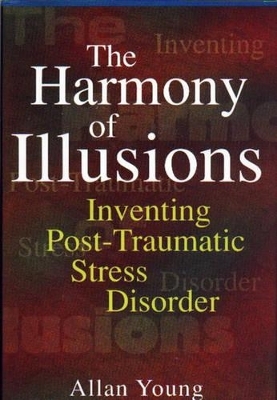
The Harmony of Illusions
Inventing Post-Traumatic Stress Disorder
Seiten
1997
Princeton University Press (Verlag)
978-0-691-01723-5 (ISBN)
Princeton University Press (Verlag)
978-0-691-01723-5 (ISBN)
- Lieferbar (Termin unbekannt)
- Versandkostenfrei
- Auch auf Rechnung
- Artikel merken
Argues that post-traumatic stress disorder is a cultural product put together by the practices, technologies, and narratives with which it is diagnosed, studied, and treated and by the various interests, institutions, and moral arguments mobilizing these efforts. This book includes an account of the treatment of Vietnam veterans with PTSD.
As far back as we know, there have been individuals incapacitated by memories that have filled them with sadness and remorse, fright and horror, or a sense of irreparable loss. Only recently, however, have people tormented with such recollections been diagnosed as suffering from "post-traumatic stress disorder." Here Allan Young traces this malady, particularly as it is suffered by Vietnam veterans, to its beginnings in the emergence of ideas about the unconscious mind and to earlier manifestations of traumatic memory like shell shock or traumatic hysteria. In Young's view, PTSD is not a timeless or universal phenomenon newly discovered. Rather, it is a "harmony of illusions," a cultural product gradually put together by the practices, technologies, and narratives with which it is diagnosed, studied, and treated and by the various interests, institutions, and moral arguments mobilizing these efforts. This book is part history and part ethnography, and it includes a detailed account of everyday life in the treatment of Vietnam veterans with PTSD.
To illustrate his points, Young presents a number of fascinating transcripts of the group therapy and diagnostic sessions that he observed firsthand over a period of two years. Through his comments and the transcripts themselves, the reader becomes familiar with the individual hospital personnel and clients and their struggle to make sense of life after a tragic war. One observes that everyone on the unit is heavily invested in the PTSD diagnosis: boundaries between therapist and patient are as unclear as were the distinctions between victim and victimizer in the jungles of Southeast Asia.
As far back as we know, there have been individuals incapacitated by memories that have filled them with sadness and remorse, fright and horror, or a sense of irreparable loss. Only recently, however, have people tormented with such recollections been diagnosed as suffering from "post-traumatic stress disorder." Here Allan Young traces this malady, particularly as it is suffered by Vietnam veterans, to its beginnings in the emergence of ideas about the unconscious mind and to earlier manifestations of traumatic memory like shell shock or traumatic hysteria. In Young's view, PTSD is not a timeless or universal phenomenon newly discovered. Rather, it is a "harmony of illusions," a cultural product gradually put together by the practices, technologies, and narratives with which it is diagnosed, studied, and treated and by the various interests, institutions, and moral arguments mobilizing these efforts. This book is part history and part ethnography, and it includes a detailed account of everyday life in the treatment of Vietnam veterans with PTSD.
To illustrate his points, Young presents a number of fascinating transcripts of the group therapy and diagnostic sessions that he observed firsthand over a period of two years. Through his comments and the transcripts themselves, the reader becomes familiar with the individual hospital personnel and clients and their struggle to make sense of life after a tragic war. One observes that everyone on the unit is heavily invested in the PTSD diagnosis: boundaries between therapist and patient are as unclear as were the distinctions between victim and victimizer in the jungles of Southeast Asia.
Allan Young is Professor of Anthropology at McGill University, in the Departments of Social Studies of Medicine, Anthropology, and Psychiatry.
AcknowledgmentsIntroduction3Pt. IThe Origins of Traumatic Memory1Making Traumatic Memory132World War I43Pt. IIThe Transformation of Traumatic Memory3The DSM-III Revolution894The Architecture of Traumatic Time118Pt. IIIPost-Traumatic Stress Disorder in Practice5The Technology of Diagnosis1456Everyday Life in a Psychiatric Unit1767Talking about PTSD2248The Biology of Traumatic Memory264Conclusion287Notes291Works Cited299Index321
| Erscheint lt. Verlag | 16.11.1997 |
|---|---|
| Zusatzinfo | 5 line drawings |
| Verlagsort | New Jersey |
| Sprache | englisch |
| Maße | 197 x 254 mm |
| Gewicht | 482 g |
| Themenwelt | Geisteswissenschaften ► Psychologie ► Klinische Psychologie |
| Medizin / Pharmazie ► Medizinische Fachgebiete ► Neurologie | |
| Medizin / Pharmazie ► Medizinische Fachgebiete ► Psychiatrie / Psychotherapie | |
| Studium ► Querschnittsbereiche ► Geschichte / Ethik der Medizin | |
| ISBN-10 | 0-691-01723-9 / 0691017239 |
| ISBN-13 | 978-0-691-01723-5 / 9780691017235 |
| Zustand | Neuware |
| Haben Sie eine Frage zum Produkt? |
Mehr entdecken
aus dem Bereich
aus dem Bereich
Die Geschichte eines Weltzentrums der Medizin von 1710 bis zur …
Buch | Softcover (2021)
Lehmanns Media (Verlag)
CHF 27,90
Krankheitslehren, Irrwege, Behandlungsformen
Buch | Softcover (2024)
C.H.Beck (Verlag)
CHF 55,90


